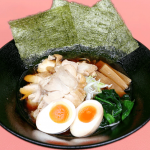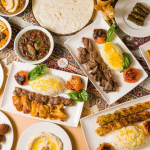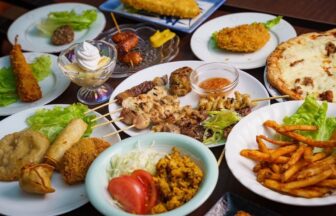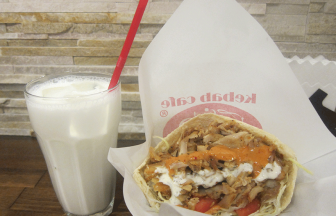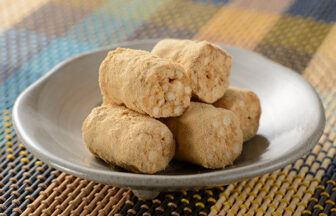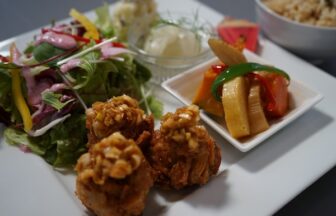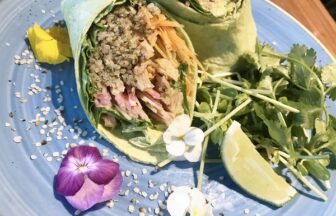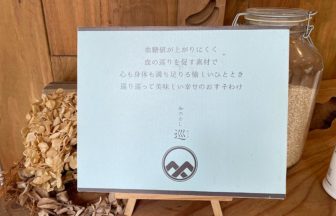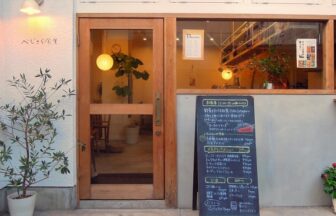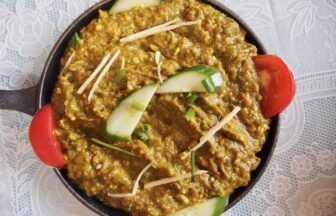Reasonable lunchtime menu, fascinating belly dance show on weekend nights
Koenji is a unique town, with 14 large and small shopping streets. There are many restaurants in those streets, and competition is very hot in the area. It is also the sacred place of Sab-culture. The atmosphere of Koenji is unusual and popular in Tokyo.
In such an area, there is a restaurant that offers Halal cuisine, which is now in its 16th year.
Bolbol is a Persian (Iranian) restaurant located a 3-minute walk from Koenji Station. Look for the Persian sign that appears on the second floor.
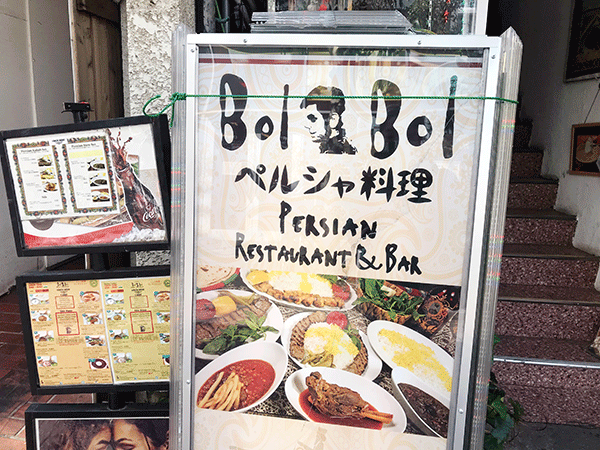
Bolbol
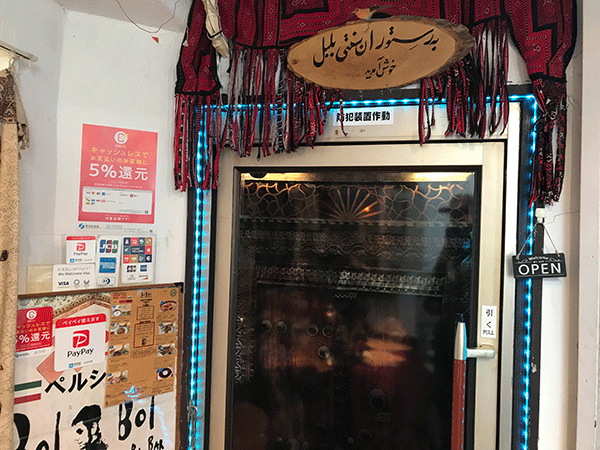
2F: store entrance
At lunchtime, you can enjoy Kebab, Iranian home cooking, and authentic Indian curry cooked by Indian chefs for less than 1,000 yen.
Kebabs made from beef and lamb mince are very soft and juicy.
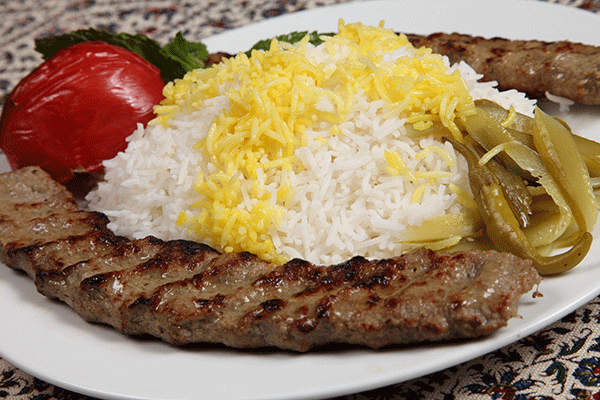
Kebab ¥1,000
A store recommendation is to put rice, kebab, pickles and baked tomatoes on top of freshly baked naan. Then, squeeze lemon for additional taste.
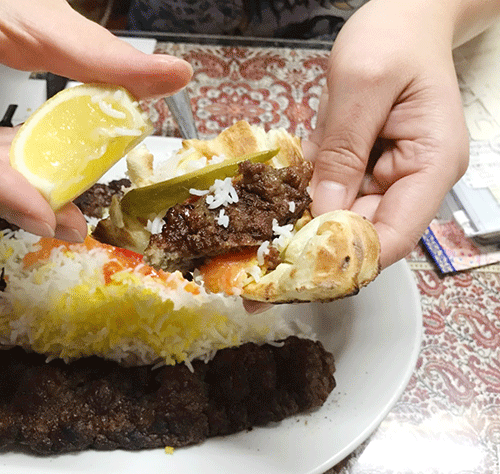
All are great combination with naan
Iranian home cooking uses a lot of lamb, wheat and herbs. This greenish “Gormesabzy” is a dish of stewed lamb and red beans. Lunch includes tomato soup with barley and basmati rice.
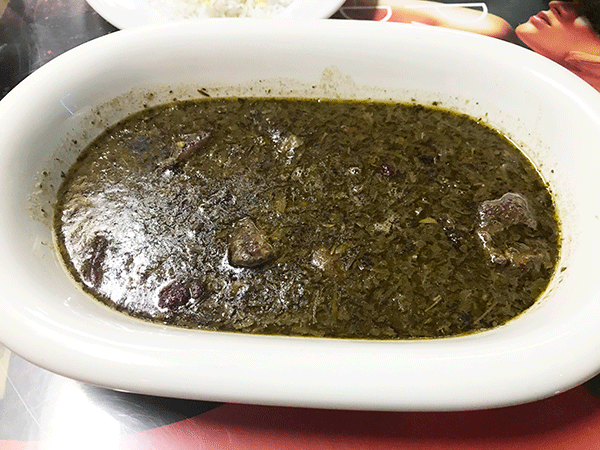
Gormesabzy ¥800
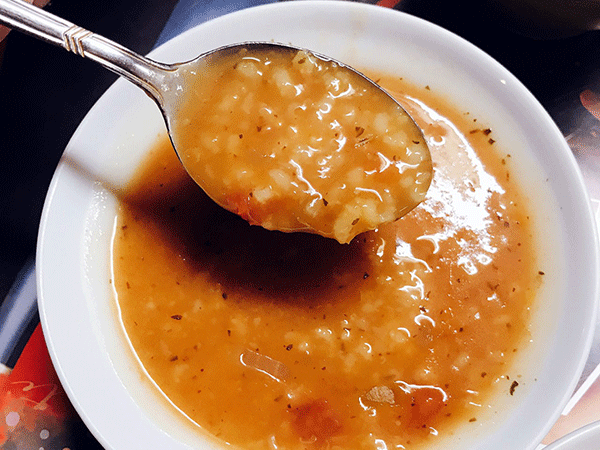
Barley and tomato soup
The lamb stewed with 6 kinds of herbs. It is very soft, and the stew and soup are supported by local Japanese people.
All the menus are healthy and delicious.
There are many ways to enjoy Bolbol. They have Hookah (Gariyun), Middle Eastern beer/wine, and a belly dance show on weekend nights.
Persian restaurant with exotic Iranian antique collection
The owner of Bolbol, is a Muslim from Tehran, Iran. The owner first came to Japan during his 20s. After earning money by working at an Italian restaurant, he decided to open the restaurant in 2004, because there was no place to eat Iranian food. He has lived around Koenji just after moving into Japan. From the owner’s perspective, Koenji seems to match the image of Iran’s national character, who likes to sing and dance cheerfully with the bandman and many people.
He also had a desire to introduce Iranian culture to many people through cooking.
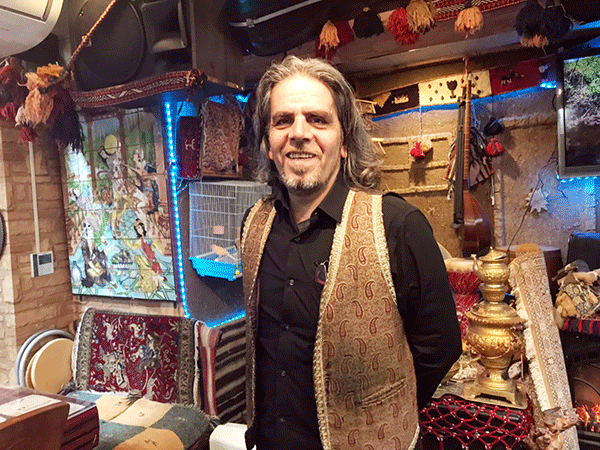
Owner of Bolbol
This commitment is also reflected to exotic interiors that enhance delicious food. All the decorations in the shop are Iranian antiques.
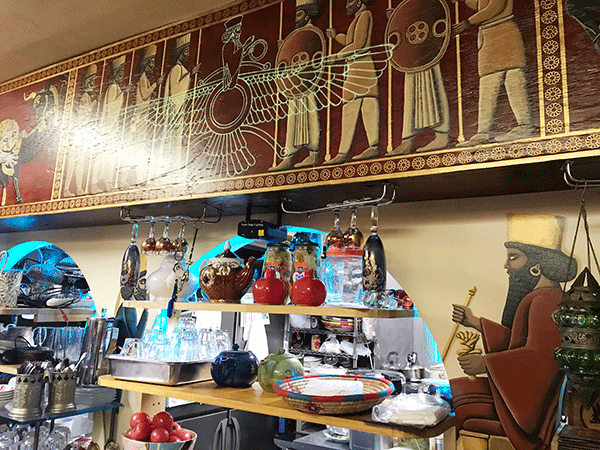
Counter
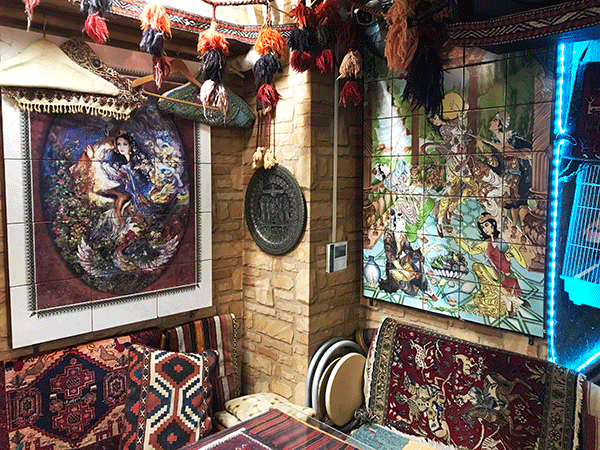
Tile art
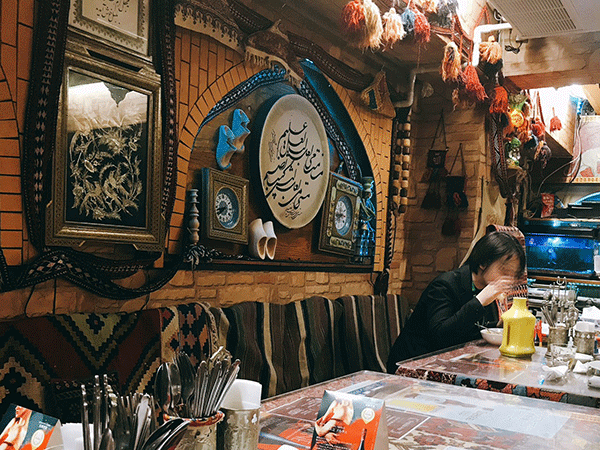
Inside the store
A teapot and a sugar bowl with Naser al-Din Shah Qajar, the fourth king of the Gharjard dynasty, are also nice. Chai with Bolbol spices are very fragrant and very delicious. Excellent compatibility with dates covered w/ coconut.
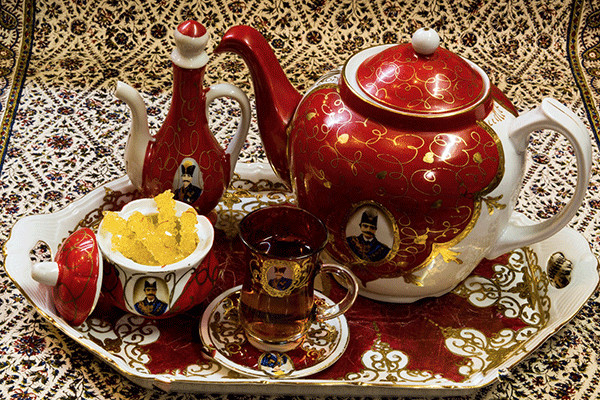
Persian chai
The name of the store, Bolbol, means “warbler.” There is no warbler, but there are many parakeets in the shop.
The owner is a very shy guy, but is very dandy and charming. If you talk persistently, he will tell you an interesting story and trivia of Iran.
Come and enjoy delicious food in an exotic space while reminiscent of Persian history.
Supervisor / Recommender

- Halal Supervisor and Foreigner Food Coordinator (Cooking, Consulting, Public Relations)
-
Click here for introduction
I currently work as an editor, but my previous job was as a chef, with many years of experience working in hospitals, restaurants, and the food service industry. Looking back, I think my connection to halal may have already been there.
Decades ago, I once worked in a cafeteria at an auction venue. Over 60% of the visitors were foreigners. Many Muslims were present, and the venue had a mosque-like prayer space. I remember being frequently asked questions about whether the meat was halal and what kind of meat it was. At certain times, the cafeteria would become as lively as a festival. The Indian restaurant next door would generously serve free biryani, curry, and sweet drinks to everyone who came. Over 100 people, including people wearing bright red turbans, galabeyas, and traditional attire, gathered in the cafeteria, all sitting around the same table and enjoying a truly enjoyable time. Looking back, it was iftar, the end of fasting, and I understand the significance of sharing, but at the time I was ignorant of halal and Islam, and didn't even consider how to respond. They only ate the curry made by the Indians in the restaurant. As I studied halal, I realized, "I wanted to eat Japanese food, but I couldn't." I regret not doing anything even though there was something I could have done.
If only it didn't contain pork! If only it didn't contain wheat or buckwheat! I could eat it... Food insecurity is different for each person.
That's why I think it's important to learn about the differences in culture, religion, and lifestyle that underlie it, and to create an environment where everyone can enjoy delicious meals in comfort.
The desire for delicious, safe, and secure food is universal. The times are calling for people to live in new ways that transcend borders and religions. I hope that halal can be a gateway to eliminating food insecurity, contributing even in some small way to a society where people can coexist and prosper with more liberal thinking, and to global harmony beyond.
Latest entries
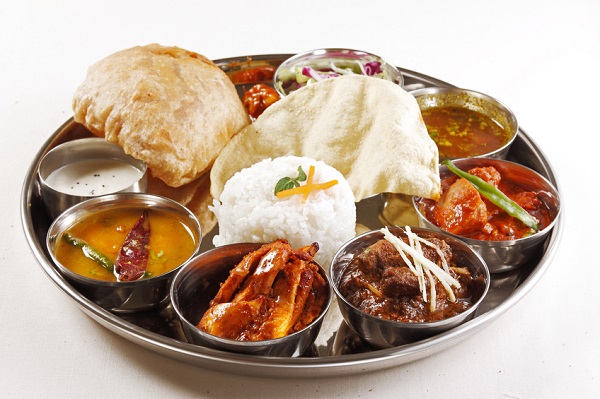 Tokyo2023年11月4日Dakshin South Indian Restaurant Otemachi Branch
Tokyo2023年11月4日Dakshin South Indian Restaurant Otemachi Branch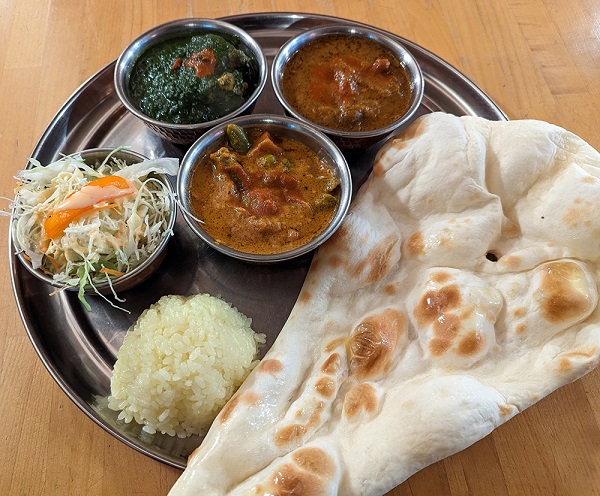 Tokyo2023年10月23日Gandhi Mahal
Tokyo2023年10月23日Gandhi Mahal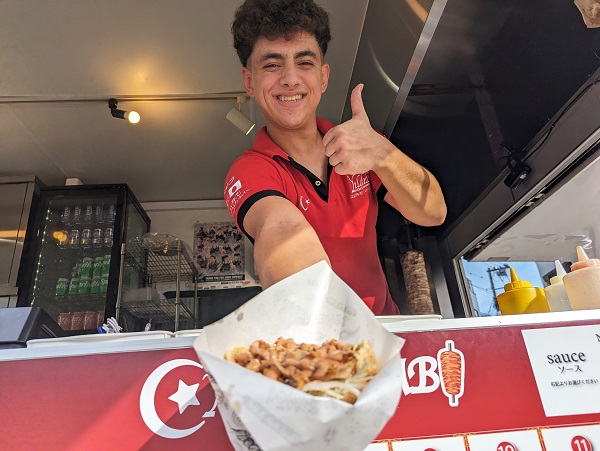 Tokyo2023年10月23日Yıldız KEBAB
Tokyo2023年10月23日Yıldız KEBAB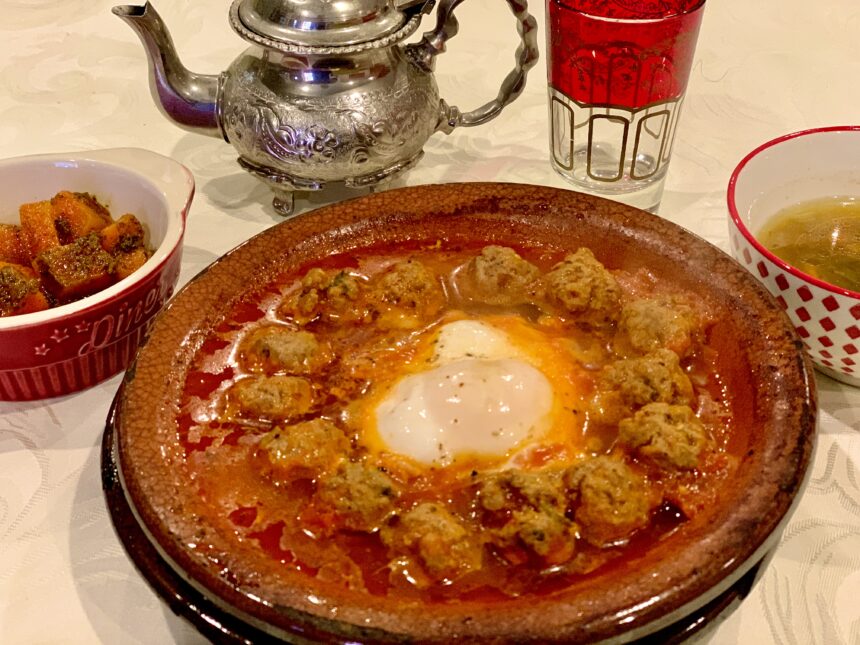 Tokyo2023年10月4日Restaurant Morocco
Tokyo2023年10月4日Restaurant Morocco













